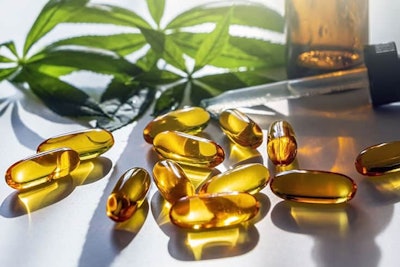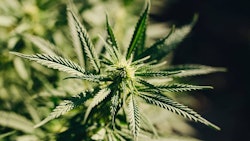
While it was no surprise the FDA withdrew its proposal—a common practice when a new administration moves in—it was still unfortunate and disappointing, says Stuart Titus, Ph.D., the CEO of Medical Marijuana Inc., a California-based holding company with subsidiaries that make and sell a range of hemp-based products.
With 10-plus years of experience in the cannabis industry, Titus says the FDA has dragged its feet on carving a clear pathway for producers of CBD as a dietary supplement to grow in the marketplace, but the agency had been making some progress with the Trump administration.
.jpg?auto=format%2Ccompress&fit=max&q=70&w=400)
“Obviously, the FDA has approved a pharmaceutical version of CBD, known as Epidiolex, which [was] back in June of 2018,” he says. “Of course … many millions of Americans are using CBD more as just a dietary supplement, and many food processors are hoping to be able to use CBD as a food ingredient. This market has been developing for nearly 10 years now. And you would have thought that the FDA would have some kind of regulatory guidance set up for the dietary supplement version of CBD.”
The manufacturer of Epidiolex, GW Pharmaceuticals, as well as chain retailer General Nutrition Centers, reportedly met with the White House Office of Management and Budget (OMB) in September 2020 to discuss proposed rules on CBD. In 2020, GW Pharmaceuticals sold approximately $510 million of Epidiolex, according to its preliminary net products sales report.
RELATED: Jazz Pharma Acquires GW Pharma for $7.2 Billion
Titus says he believes Epidiolex has the potential to be a blockbuster drug, meaning it could generate a billion dollars a year in annual sales.
“So, certainly the pharmaceutical interests seem to be very well taken care of,” he says. “And it's just been a shame that those of us, thousands of producers of CBD, in terms of dietary supplement-type of products, are not being given equal footing, if you will, with regulations that the FDA could easily put in place.”
In May 2019, Titus traveled to the FDA headquarters in Washington, D.C., where he had the opportunity to speak before the FDA about CBD and its benefits as a dietary supplement, as well as the safety and efficacy of CBD, during a formal hearing that also included input from other doctors and industry leaders alike.
“The FDA has allowed the industry to develop, but they really haven't done any study and research on it themselves, where they haven't actually provided funding for those of us in the industry to do more study and research,” Dr. Stuart says.
In June 2020, seven companies—BoulderBotanical & Bioscience Labs, CBDistillery, CBD AmericanShaman, Charlotte’s Web, Columbia Care, HempFusion and Kannaway—formed an industry-wide study to measure the effects on the liver of daily use of full-spectrum hemp-derived CBD and CBD isolate by more than 700 healthy adults. The study was aimed at answering the FDA’s request for science-based data so it could confidently determine the appropriate regulatory path for hemp-derived CBD products.
The 700-plus consumers in the study went in for blood tests aimed at identifying any residual toxicity to the liver of the human body, specifically if they experienced elevated levels of potentially toxic liver enzymes, Titus says.
When it comes to CBD pharmaceutical use, especially for children, there’s a warning on the prescribing information for Epidiolex for doctors to watch for elevated levels of those toxic liver enzymes, he says.
“But it’s nice to see that the natural botanical products don't cause any of this residual toxicity,” Titus says. “This [700-plus] patient study that we're doing, we're going to be proving this to the FDA, that CBD is now safe. So, this study is now coming close to conclusion, and the FDA has now put a new onus on the industry that they want to see a similar study done with dogs and other animals, to make sure that there's no residual toxicity by using CBD to deliver to these animals, because a big market is now developing [for animals].”
Titus says he and his peers are happy to cooperate with the FDA in that regard, but the fact remains that CBD in the dietary supplement arena has been waiting for FDA regulations for more than eight years.
The FDA has made efforts to regulate some of the more unscrupulous CBD producers that make unsubstantiated medical claims, and certainly that type of enforcement is needed and necessary, Titus says.
“But for us in the industry to have a clear pathway, so that we can sell these wonderful CBD products currently like we are on the marketplace, we [need to] have a formal path cut out for this to be an approved dietary supplement, just like vitamin C is with a recommended daily allowance, if you will,” Titus says. “We really believe these non-psychoactive cannabinoids pose no harm or threat to society.”
As millions of Americans use CBD, Titus says it’s “a little two-faced” of the FDA to look the other way in terms of it being a dietary supplement, yet the agency is approving the drug version. The hope is that, in the end, the science will prove itself, and the FDA will work with the Biden administration to advance appropriate regulations and policies to clear a path for legal over-the-counter CBD, he says.
In the meantime, Congress is on a path to taking action through the reintroduction of the Hemp and Hemp-Derived CBD Consumer Protection and Market Stabilization Act with bipartisan support in the U.S. House of Representatives. First introduced in the last Congress as H.R. 8179, the act would create the first pathway for non-medical CBD products to be approved and regulated by the FDA, thereby promoting consumer safety.
“It’s nice to see that Congress is taking the lead, because they’re just sick of the FDA dragging their feet on this particular issue,” Titus says. “There were a couple of bills in [the last] Congress to potentially alleviate this and carve out that nice pathway that we in the industry wanted.”

























